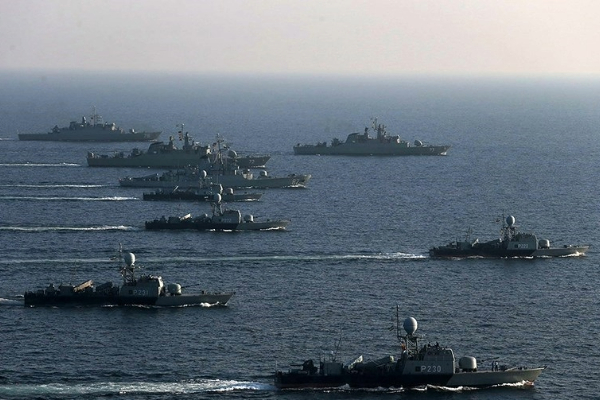Russian, Chinese, and Iranian navy ships will hold a joint exercise in the Arabian Sea from the Chabahar port in the Gulf of Oman.
The joint exercises, called “Maritime Security Belt – 2024”, will involve warships and aviation, the Russian defence ministry said in a statement on Monday.
The exercises will continue for three days and involve vessels and aircraft from the three countries. Envoys from the militaries of Azerbaijan, India, Kazakhstan, Oman, Pakistan, and South Africa are in attendance as observers.
The Russian defence ministry said that the main exercise would take place in the Arabian Sea in the Gulf of Oman.
The exercise comes amidst increasing incidents of Iranian-backed Houthis attacking Western cargo ships in the Red Sea prompting the US-led coalition to launch counterstrikes on the militant group.
Located strategically near the entrance to the Strait of Hormuz, these exercises gain added significance as this area serves as a critical passage that connects the Gulf of Oman and the Persian Gulf, playing a pivotal role in global trade, particularly concerning the sea exports of hydrocarbons by the Arab nations of the Gulf and Iran
For the Russians, two Pacific Fleet ships, the Slava-class guided missile cruiser Varyag and the Udaloy-class frigate Marshal Shaposhnikov will participate. The Chinese will send guided-missile destroyers Urumqi, Linyi, and the supply ship Dongpinghu, while the Iranians are likely to contribute several helicopters and a dozen vessels of various sizes.
The exercises which began in 2019 is a joint venture between Moscow, Beijing, and Tehran. China missed the 2021 drills, but has participated in every exercise since.
Since last year, rebels have launched 403 missiles or drones against 61 ships, causing disruptions to international trade.
The three countries are at the receiving end of Western sanctions ranging from the Russia-Ukraine conflict, Iran’s nuclear programme, and human rights abuses in China.
In a career spanning three decades and counting, Ramananda (Ram to his friends) has been the foreign editor of The Telegraph, Outlook Magazine and the New Indian Express. He helped set up rediff.com’s editorial operations in San Jose and New York, helmed sify.com, and was the founder editor of India.com.
His work has featured in national and international publications like the Al Jazeera Centre for Studies, Global Times and Ashahi Shimbun. But his one constant over all these years, he says, has been the attempt to understand rising India’s place in the world.
He can rustle up a mean salad, his oil-less pepper chicken is to die for, and all it takes is some beer and rhythm and blues to rock his soul.
Talk to him about foreign and strategic affairs, media, South Asia, China, and of course India.





